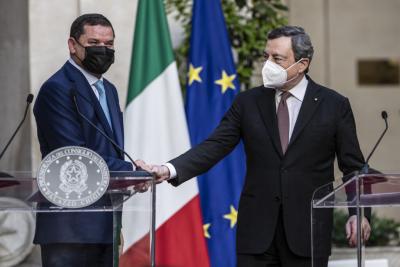Draghi to Libyan PM, 'rights of migrants must be respected'

ROME - On his first official visit to Italy since he took office in March, Libyan Prime Minister Abdul Hamid Dbeibah met with Italian PM Mario Draghi and spoke at an Italy-Libya business forum at the Ministry of Foreign Affairs.
At the conference at the Palazzo Farnesina on Monday, at which “the new Libya presented itself to Italian companies”, according to the Foreign Ministry, Dbeibah addressed a large group of representatives of Italian industry, eager to take part in the economic rebirth in Libya under the new government.
Dbeibah, who came to Rome with seven ministers, said, “we want to rebuild Libya better than before, to advance,” and for this project, “Italy is our best partner.” He defined Italy as his country’s number one partner “in the economy, in petrol, in development, in infrastructure, but also for hospitals, the rebuilding of schools…. In the last 10 years we have worked hard for safety, to offer you a friendly neighbouring country.”
He continued, “we know each other very well,” and he expressed a wish to be able to “remove all the constraints that hinder Italian businesses.
In Draghi’s talks with Dbeibah at Palazzo Chigi on Monday, the ongoing migrant crisis in the Mediterranean was the prime topic of discussion. Draghi said, “Italy remains at Libya’s side and confirms its firm commitment to consolidating peace and security.”
He continued that migration and humanitarian issues “are a priority for Libya and Italy. We have looked into the checks on Libyan borders, including southern ones, the fight against human trafficking, assistance to refugees, humanitarian corridors, and the development of rural communities. Italy intends to continue to fund the assisted voluntary repatriations and humanitarian evacuations from Libya. I also believe it is in the interests of Libya to ensure that the rights of refugees and migrants are fully respected. Italy will continue to do its part in terms of resources and training, but it needs determined and rapid action by the EU.”
ol


